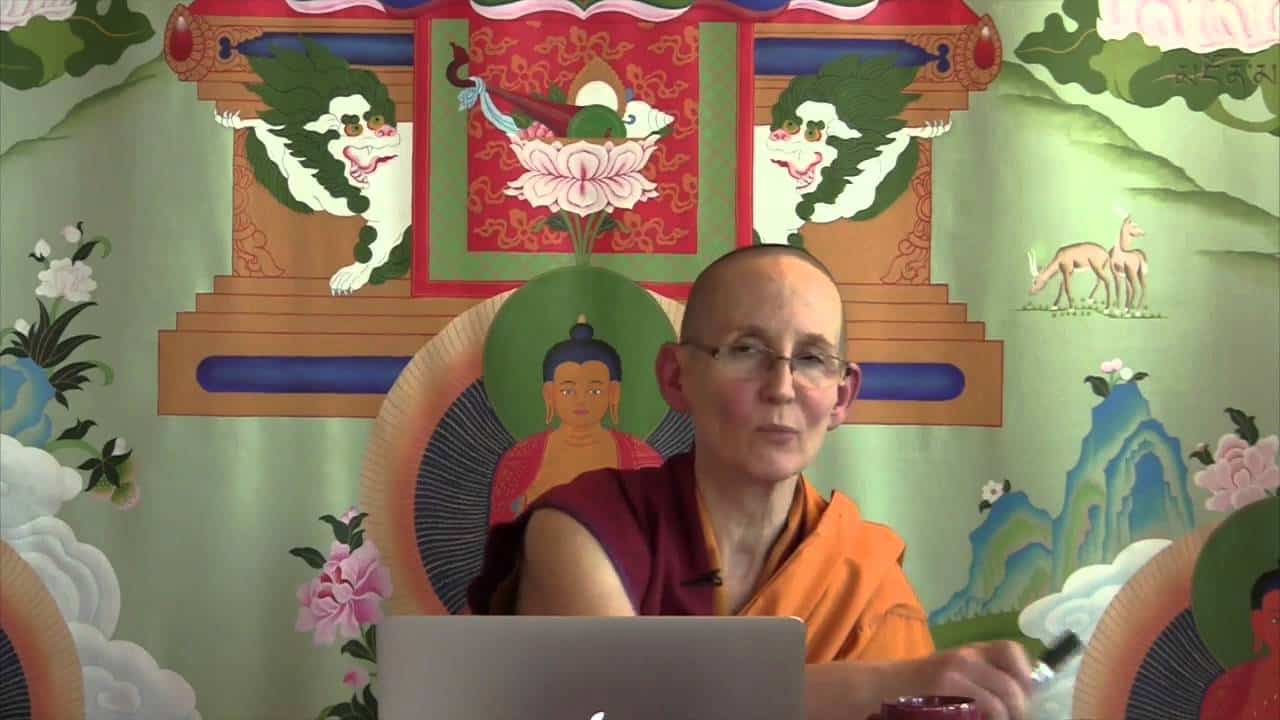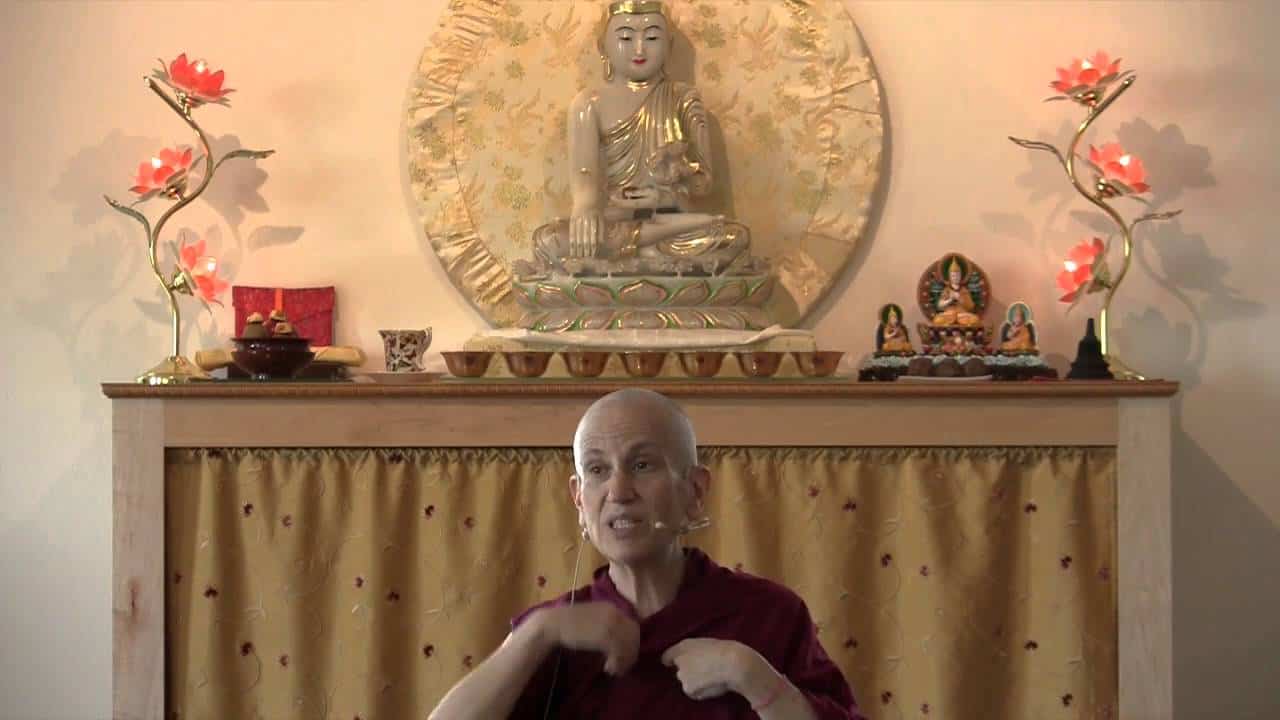The kindness of others
Part of a series of teachings on a set of verses from the text Wisdom of the Kadam Masters.
- Spending time contemplating the kindness we receive from others
- Considering that even if we’ve received harm, the kindness has been much greater
- How we benefit from the jobs others do, whether they intend to help us or not
Wisdom of the Kadam Masters: The kindness of others (download)
We were talking about equalizing and exchanging self with others, and we had started on this nine-point meditation of equalizing self and others. The first three points we covered before. They’re from the perspective of others: that everybody wants happiness equally, ourselves and others. In terms of beggars it wouldn’t be right to give to some and not to others, because everybody’s equal. Similarly with patients, people who are sick, it wouldn’t be right to help some and ignore others, because they’re all equal in suffering.
The next set of three focus more on ourselves. Here the first one is that everybody’s been kind to us in this life, previous lives, and will be kind to us in future lives. This is the point that I think it’s very very valuable for us to spend a great deal of time on this. Obviously I can’t go through it in detail in a short talk, but to really do this meditation repeatedly and in depth, because it completely changes how you feel about the world and your place in it. Totally changes that. Most of us feel, like in El’s poetry, that somebody else gets the big piece of cake, and we get left out in one way or another. When we really sit down and think about how our life depends on every other living being who has been kind to us, that feeling of “life is unfair” and “other people have gotten more,” and “I’m not appreciated enough….” That completely disappears. It’s like a heavy weight being taken off your back. You see that in actual fact you’ve been the recipient of unbelievable kindness in our lives. It’s just amazing.
We often get stuck on the thing: “Other people don’t intend to be kind to me. The people who put in the fibre optics didn’t intend to be kind to me, they were just doing their job so they could get some money.” Why they did their job is not the issue. The fact is that they did it and we have fiber optics and that gives us so much ease with all the work we do.
If they hadn’t done that we would have been back in the stone age with the receptor on Mount Hoodoo. Or even before, really in the stone age, with typewriters. Can you imagine? If it weren’t for all the people who made computers…. I don’t know how I ever got through college without a computer. I think that’s one of the 10 marvels of the universe. [laughter] That any of us even finished high school without computers.
When you think that all these people are doing so much work, and we don’t even know them to say thank you, and yet we benefit extraordinarily from what strangers have done, not to mention the kindness of family and friends. And then even the kindness of the people who harm us because due to their actions, they challenge us, they push us out of our complacency. And as Dharma practitioners that’s what we want. We don’t want to become complacent. People who are not nice to us, who don’t follow our rules of the universe, they’re very kind to us in the sense of stimulating our Dharma practice, because they make us grow in ways we never would have grown otherwise.
When we really think about this it changes how we feel about strangers, it changes our relationship to the people who have harmed us in the past, and then our whole look on being a living being in this world changes. It makes a huge difference, especially when you read the newspaper daily, then when you meditate you see the kindness of all the beings, think of the kindness in previous lives and the kindness that will be extended to us in future lives, then we know that the newspaper is not all there is. This thing of despair and disillusionment…. Hey, there’s an incredible amount of kindness in this world. We saw it in effect even after the attack in Brussels last week. How many people reached out to help people who were injured? To go and make further arrests. There are just so many instances of people cooperating out of a wish to serve society that we benefit from. Very important to think about that, like I said, repeatedly and in depth.
The second point there is our “yes, but….” mind. “Yes they’ve been kind, but they’ve also harmed me.” And, “Let me take out my file…. Actually I don’t need the file, I have it all memorized. I can tell you every harm I’ve received since day one. I’ve never forgotten any of those, my list of traumas, abuses, being ignored, being deprecated, all the unfair things that have been done to me….”
I think I told you that when I did Vajrasattva retreat when I first met the Dharma I realized I was still mad at my second grade teacher because she didn’t let me be in the class play. Miss D. I haven’t forgotten that. So our mind comes up with these things, and then we have to say, “But if we take the amount of harm we’ve received from others from the amount of benefit we’ve received from them there’s no comparison. Okay, she didn’t let me be in the class play in second grade. But she taught me the whole year all the other subjects on the basis of which I’m able to read and write and do things now. So there’s no comparison. And even other people who have harmed us directly or indirectly, very often it’s the same people who have helped us, and we see harm as they’ve been helping us all along and then there was a bump in the road. We remember the bump, but we don’t remember all the smooth pavement. Then especially, the help we’ve received, much more than the harm.
And then the third point is we’re going to die before too long so what is the use of holding a grudge against somebody who’s harmed us?
We’ve tackled the “yes, but” mind in point two, “Yes, they’ve been kind, BUT they’ve also harmed me.” Well compare the harm to the benefit. “But still I’m hanging on to having received this harm. Don’t you understand how traumatized I am….” Not just traumatized, “How justified my hate and anger are. My anger, my hatred, justified! It’s going to bring me happiness.” And then you think, “Well check that out. I’m going to die before too long, how much benefit is my anger and hatred and resentment and jealousy going to do for me?” Do I want to die with that kind of mind? Go out of this world with hatred and jealousy like that? Well, if I don’t want to die with that kind of mind tormenting me, I’d better drop it now, because we don’t know when we’re going to die.
That point, also, very good for let go, just drop it.
Of course, we have to do these meditations and these points over and over and over again. But as we do, and we really see what the Buddha’s talking about, it makes total sense. Then our mind begins to get reformed.
This is how His Holiness, wherever he goes he has friends, he sees friends, he see kindness. Even all these people who demonstrate outside his teachings. Even the Beijing government. On a personal level he sees friendship. On a political level you have to deal with the politics. But he doesn’t get angry about any of that. So if he doesn’t, why should we?
When you’re doing these three points here, really look at whenever your mind says “yes, but.” Actually, in any of the lamrim meditations you do. When your mind says “yes but” stop and say “but what?” And let that reason come up. If you don’t look at what your reason is then you’re never going to really get rid of the emotion that’s a response to it. You have to let that reason come up and then look at that reason using your reasonable, clear thinking mind to see if that reason is true or not true. But if we don’t look at the crazy reasons our afflicted mind gives then we can’t get rid of the afflictions themselves.
Let me give an example: You’re having some difficulty with a family member, and you’re really upset about the difficulty with the family member. You look, and you ask yourself, “Would I be upset if somebody else did that same behavior to me?” Probably not. Maybe, but probably not. We’re usually much more sensitive to things that family members say than things that strangers say to us. Then you look: “Well, why am I more sensitive to that? And why is it so unbearable to me that a family member says this or that or the other thing to me?” And then there’s the thought, “Because families are supposed to have each other’s back. Families are supposed to be close. Families are supposed to help each other.” Right? Isn’t that what we all grew up thinking? I was taught that. Then you stop, okay, that’s my “yes but.” Because people should be close and family members should help each other. And then you stop: “Is that true?” I said they should, does that mean they will? Does that mean they have to? Why should they? “Should” has nothing to do with reality. They act the way they act. Why am I holding on to this idea of how a family should be? It’s a crazy idea. Whose family is like that anyway? How many people do we know where the family members really take care of each other. All of the family members take care of each other. Maybe in Peter Pan’s land. Then you say, “Well, I’m holding on to something really unreasonable, so let’s drop that ‘should’ about how family should be, and let’s just… This is just how some person’s acting. What can I do about it?” Be polite. Be kind. Don’t take it personally.
Venerable Thubten Chodron
Venerable Chodron emphasizes the practical application of Buddha’s teachings in our daily lives and is especially skilled at explaining them in ways easily understood and practiced by Westerners. She is well known for her warm, humorous, and lucid teachings. She was ordained as a Buddhist nun in 1977 by Kyabje Ling Rinpoche in Dharamsala, India, and in 1986 she received bhikshuni (full) ordination in Taiwan. Read her full bio.


